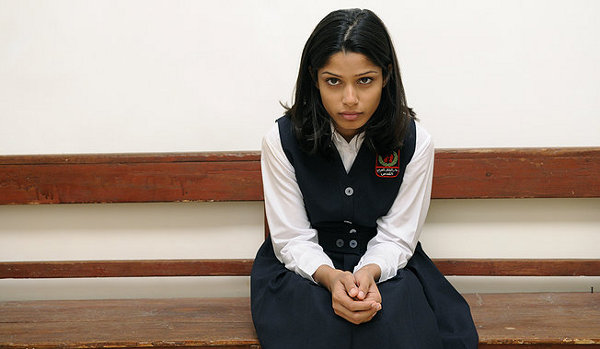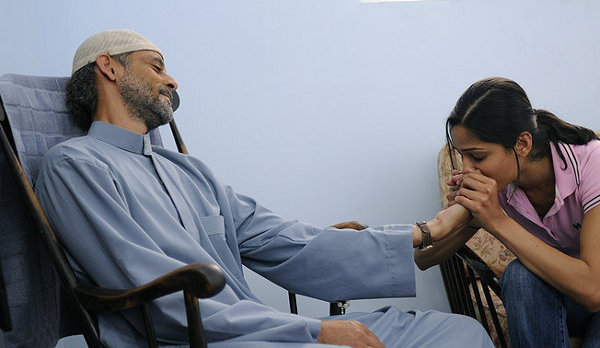- Title: Miral
- IMDB: link

 Directed by Julian Schnabel and adapted from her own novel by Rula Jebreal, Miral is an attempt by the Jewish filmmaker to examine life from the point of view of several Palestinian women after the establishment of the state of Israel.
Directed by Julian Schnabel and adapted from her own novel by Rula Jebreal, Miral is an attempt by the Jewish filmmaker to examine life from the point of view of several Palestinian women after the establishment of the state of Israel.
The film begins with the rescue of 55 orphaned children by Hind Hussein (Hiam Abbass). The children were the first discovered survivors of Deir Yassin Massacre, but within six months the number of children would swell to several thousand.
I’ll stop for a second to discuss Hind Hussein, who is definitely worthy of a film dedicated to her life and accomplishments. Using what resources she had, Hussein transformed her grandfather’s estate into an orphanage and institute of learning which continues today. Abbass gives a strong performance, even overcoming some questionable old age makeup for the character’s later years. But, somewhat to the film’s detriment, Hussein isn’t the film’s main character. In fact, I’m not sure it has one.
Disconnected from Hussein’s story are the struggles of Nadia (Yasmine Elmasri), a troubled young woman who can’t escape the bad memories of her past even after she’s found a loving husband (Alexander Siddig). She leaves her young daughter, Miral (played by Yolanda El Karam and later Freida Pinto) in the care of husband who relies on Hussein for help.
If you think it’s odd that it took me almost 150 words to mention the title character think how I felt when the story took a full quarter of the film’s full running time to introduce her to the audience. The film takes a definite turn once Pinto assumes the role as Miral, in both good ways and bad, and the story concentrates on a single timeline, and character, rather than the several it had up until that point.

Once Miral has grown up into a young woman she faces the challenges of Israli-oppresion, a growing need to speak her voice, and the disapproval of her father and of Hind to the growing rebellion inside her and her relationship with a PLO leader (Omar Metwally). Some of these storylines work better than others, but Pinto does provide a central figure to the film’s second-half from whose vantage point the audience is able to view the world.
Miral certainly isn’t without flaws. It’s more than a little fractured (especially at the beginning) and feels far too much like chapters of the book it was taken from rather than the natural flow of a feature film. It meanders at times, and there’s easily enough material here for a mini-series rather than the under two-hour running time in which everything is condensed.
The hand-held camera work which tries to put us into the action drove me nuts at times, and the use of news footage to bridge the gap as the film jumps years (or decades) into the future is only somewhat successful. There are also moments in Pinto’s story where the film feels more focused but also a little too familiar and even borders on cliché.

Even with these problems, Schnabel succeeds in giving us an emotionally powerful story and the type of film that shows the positive result of a filmmaker examining circumstances from the opposing point of view. Schnabel has taken some criticism for making the film from the American Jewish Committee, but the film’s message of hope, peace, and fulfilling promises are worthy of recognition and discussion.
If the writing struggles at times the acting is top notch. Pinto and Abbass give all their all, and I’m always glad to see Siddig get his hands on a meaty role. Despite the film’s inconsistencies and attempts to squeeze far too much into a single film, Miral does provide an emotional payoff and the beginning of a serious discussion about the events between Israel and the State of Palestine without coming off as pretentious or tedious. That’s more than you can say about most films.
